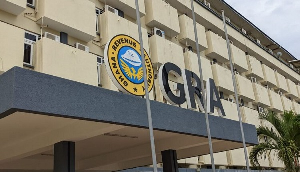Day in, day out Ghanaian traditional rulers, reflecting frustrations within the development process, are increasingly talking the development talk – of course from their traditional values vintage point, riding on the coattail of the developing democratic dispensation against the climate of military juntas and one-party autocracy 34 years ago. It is in this climate that the quintessential Okyehene, Osagyefo Amoatia Ofori Panin II, one of Ghana’s leading traditional rulers and intellectuals, grumbled about “centralized government,” by which “the central government system we inherited from the British colonial master was only good for the 6.5 million people in the country in 1957 but it is not working for the 22 million people in 2007.”
The Okyehene’s concerns reveal the schisms within the Ghana nation-state and the ensuing increasing open and critical debates – from unfair and inadequate distribution of public goods to some ethnicity tensions to overburdened public institutions. But the main issue is what the ex-colonial institutions and its development paradigms left behind have not been harmonized enough skillfully with the traditional Ghanaian institutions and development paradigms for deeper and broader progress; making, as the Okyehene observed, “out of 48,000 settlements in the country only 12,000 had government agencies such as post offices, hospitals and police stations.”
If there are skewed public goods and some ethnic tensions in Ghana, as the Volta Region’s Anloga chieftaincy dispute and recent ones in some Northern Region and Greater Accra traditional areas show, it means Ghanaian elites have not re-orientated the nation-state holistically from within Ghanaian indigenous values since the British colonialist left some 50 years ago. The British colonialist, despite their policy of indirect rule aimed at development, still didn't know well enough Gold Coast/Ghana/Africa because they were not Africans and didn't know and understand the culture enough from inside out. It is from seeing the Africans culture from their perspectives, generally, and not from African standpoint, that made them think Africans are “primitive” and intellectually and morally “deficient,” and should be “developed” so as to “civilize” them for progress a la common humanity.
Such policy framework has distorted and confused development notions have dogged Ghana since freedom from colonial rule in 1957. In fact, compared to the Southeast Asians, Ghana is still, more or less, run like the ex-colonialist' “centralized despotism” - with a powerful central government and weak local communities in terms of mode of distribution of power and its attendant provision of public goods and institutions. This is what the Okyerehene was talking about when he spoke of "centralized governance," where the public goods are unevenly distributed and more or less managed as the colonialists left off without any creative mixture that reflects the authentic Ghanaian environment. The British colonial development policy, according to the Ugandan social scientist Mamood Mamdani, currently at Columbia University, in his controversial “Citizen and Subject,” was driven by the British self-interest, and not African interest, and used heavily indigenous African traditional rulers and traditional institutions under the colonial “decentralized despotism,” making the African more of subject than citizen in development terms.
Still, in “States and Power in Africa,” Jeffrey Herbst argues that the reason why there are uneven distributions of public goods in Africa is that the colonialists’ development policies were driven by natural resources and population density, and not any real nation-wide African peoples’ needs. Largely, post-colonial Ghanaian elites have not reversed all these uneven provision of public goods, a demonstration of their incapacity to appropriate from the traditional institutional environment, leading to some tensions and some ethnic conflicts. No doubt, James A. Robinson, an economist at the University of California, makes the case that, “institutions,” which reflect “the way societies are organized,” is the “fundamental cause of countries’ development or underdevelopment.” Part of the Ghanaian underdevelopment may not necessarily be because of inadequate or uneven public goods but Ghanaian elites’ powerlessness in appropriating their traditional public goods to balance the inadequacies of the still running ex-colonially created public goods.
When some chiefs of the Greater Accra Region said traditional rulers should be included in the judicial system “in order to make the delivery of justice accessible to local communities throughout the country,” they were, in effect, saying that the Ghanaian development process have not been holistic enough and, therefore, not informed by our innate developmental wisdom sufficiently; that the Ghanaian development process doesn’t reflect authentic Ghanaian traditional institutions; and that Ghana’s inadequate prosperity is as a result of its elites’ incapacity to tap its traditional institutions – either in terms of physical or human capital – for greater progress. This misunderstanding of Ghana’s development process by its elites explains Nene Klangbojo Animle’s (Paramount Chief of Osu Doku) argument that “the erosion of traditional judicial powers of the chieftaincy institution from the modern judicial administration has denied rural people,” who form majority of the population, “speedy justice” and frustration. It is this schism within the development process, as Nene Animle observes, that has created in its wake increased “cases of instant justice and voodoo justice” Ghana-wide.
From the bloody Anloga chieftaincy conflict to Otumfuo Osei Tutu 11, the Asantehene, resolving traditional land disputes to open up the development process to Nene Klangbojo Animle, the Osu Paramount Chief, arguing for the need to balance traditional judicial practices with the orthodox ones in order to lessen the burden on the formal judicial system to Osagyefo Amoatia Ofori Panin II, the Okyehene, examining the uneven and inadequate public goods, especially in most rural areas due to unresolved ex-colonial policies, the Ghana nation-state is yet to be secured developmentally. Part of the inadequacies stem from the fact that the Ghana nation-state, as a development project, is still viewed from British ex-colonialist’s point of view (especially its “centralized despotism” policy) and development paradigms, and not from traditional Ghanaian’s/African’s, thus creating immense misunderstanding, needless burden, and unnecessary schism within the development process despite the fact that there are huge untapped traditional values and institutions waiting to be appropriated for progress.















